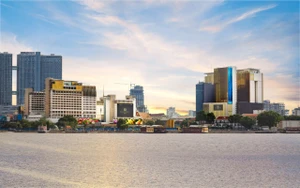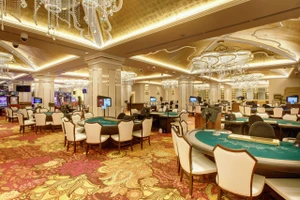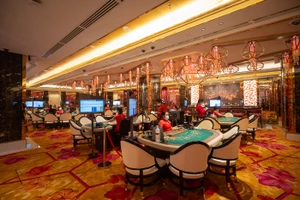Brave new NagaWorld
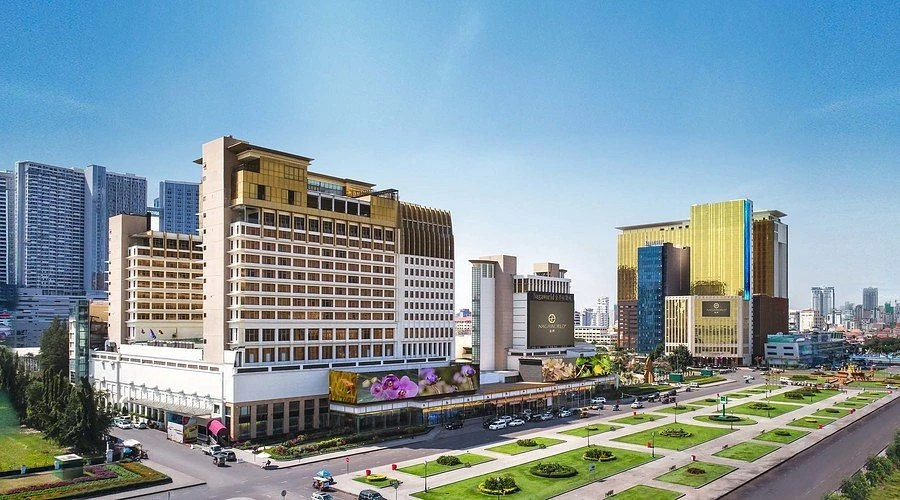
After a quarter century of virtually uninterrupted success, Naga Corporation faces two unprecedented challenges. For the operator of NagaWorld, the monopoly integrated resort in Cambodia’s capital Phnom Penh, one situation is far more easily addressed than the other.
In the post-Covid climate of decreased mainland Chinese international travel and the Middle Kingdom’s diminished appetite for overseas investment amid domestic economic woes, NagaWorld’s 2023 gross gaming revenue of US$514.8m was down 70% from US$1.7bn in 2019.
Its net profit fell 71% to US$52.3m, and EBITDA was off 56% to $295.3m. Naga shares traded in Hong Kong have fallen from an all-time high of HK$14.28 (US$1.83) in October 2019 to below HK$4 now.
Beyond the numbers, Naga founder and CEO Chen Lip Keong passed away in December at age 75. Born in Malaysia and trained as a physician before finding success in property, Chen came to Cambodia during the early 1990s looking for oil.
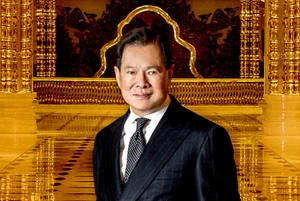
Instead he struck gold in gaming, transforming Cambodia tourism from a punk rock punchline into a reality, boosting his fortunes and the host nation’s.
“Dr Chen’s biggest contribution and the thing I admired about him was his ability to envision what others scoffed at,” former Naga adviser Adam Steinberg says.
“If you think about the mid-1990s when he commenced operations at Naga, Cambodia was only 20 years removed from a civil war with a decimated population and widespread poverty. He had a vision to invest in the country, bringing in tourism to grow the economy.”
“First world destination”
Chen, the casino billionaire with whom I spent the most time and spoke with at greatest length, realised his ambition of creating “a first world destination in a developing nation”. Naga began gaming in 1995 on a rusty barge in the Bassac River off the Mekong. It holds a 70-year gaming licence to 2065, including a monopoly in Phnom Penh, extended to 2045 in 2019.
“Dr Chen was a visionary who knew exactly what he wanted and how best to achieve those goals,” Euro Pacific Asia Consulting managing partner Shaun McCamley says. “He was instrumental in putting Cambodia on the gaming destination map.”
In Steelman Partners CEO Paul Steelman’s eyes, “Dr Chen’s innovative approach established him as one of the original pioneers in the Asian gaming industry.
“His emphasis on maximising space utilisation by designing compact yet luxurious hotel rooms demonstrates a keen understanding of the preferences and habits of Asian gamblers.”
Steelman, architect of the Naga2 expansion opened in 2017 that elevated Naga to the top rank of Asian IRs, adds: “[Chen’s] insistence on achieving high quality standards while adhering to reasonable budgets underscores his pragmatic approach to realising his grand vision for Naga.”
Savvy politics
“Dr Chen illustrated the ability to develop an integrated resort in what many could consider a challenging political environment,” GMA Consulting managing partner Steve Gallaway says. “He did a fantastic job of weaving his way through Cambodian and Chinese politics to see the success of Naga come to fruition.”
Naga has long worked closely with Cambodia’s Ministry of Tourism. The company was instrumental in engaging state-owned China International Travel Service to organise tours from second-tier Chinese cities to Angkor Wat and Phnom Penh. The business also partnered with CITS affiliate China Duty Free on the retail section of Naga2.
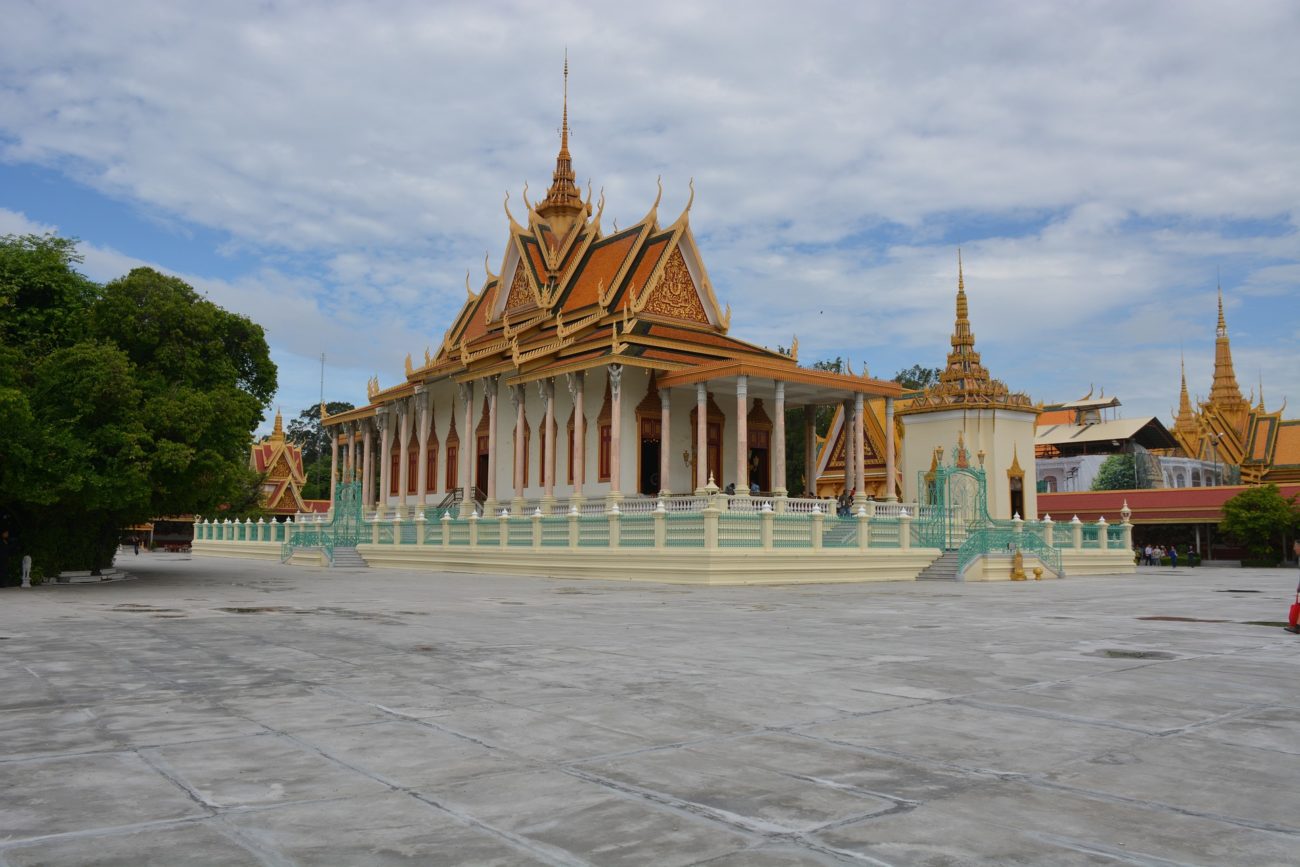
In 2006, NagaCorp became the first gaming company to list in Hong Kong. This move was less about seeking financing than legitimacy, Chen told me. When Cambodia had only rudimentary anti-money laundering practices, Naga instituted its own AML regime based on global best practices and hired international experts to monitor compliance.
Stormy weather
“Naga’s openness to share their performance with investors and have open investor relations allowed them to weather many storms,” Gallaway says.
It faces perhaps its most dangerous storm in the wake of Covid, partly due to its own success. During its formative years, NagaWorld catered to neighbouring markets – Naga’s gaming is for foreigners only – starting with Vietnam, which opened its first casino for locals in 2019, plus Chen’s native Malaysia, which has only one casino, Resorts World Genting.
As Naga grew, it looked to Thailand, which has no casinos yet. Naga also dabbled in the VIP market, engaging with junket promoters too small for Macau or looking for a change of pace.
But Chen also had his eye on the big prize – China. Chen mused about surrounding China with a necklace of casino resorts, beginning in a special economic zone outside Vladivostok. The business pushed for a high speed rail link from China to the capital of Russia’s far east.
Naga’s Vladivostok project was postponed indefinitely in March 2022, following Russia’s Ukraine invasion and ensuing international sanctions. But it hopes to revive the project when geopolitics allow.
VIP explosion
Back in Phnom Penh, Naga incentivised employees to learn Chinese and, with Naga2 upping the room count to 1,700, declared itself China-ready, able to deliver player experiences comparable to other regional IRs at a lower cost of living it up.
Without Macau’s 39% gaming tax rate – Naga made nominal payments in lieu of gaming tax until Cambodia’s long awaited 2020 gaming law mandated a 4% tax on VIP revenue and 7% on mass play – and 1.25% commission cap, Naga could offer sweeter deals. Macau junkets dove in.
In 2016, the year before Naga2 debuted, Naga’s mass gaming revenue was greater than VIP – US$275.2m to US$225.7m. In 2018, Naga2’s first full year of operation, mass revenue rose 33% to US$365m while VIP revenue rose 374%, topping US$1bn. Then in 2019, Naga’s VIP revenue of US$1.24bn matched that of MGM China’s two properties in Macau.
Going for three
In April 2019, Naga announced Naga3, a 544,801 square metre (5.86 million square foot) triple tower project with 4,720 guest rooms to cost US$3.5bn and be completed by 30 September 2025.
Naga’s Hong Kong stock exchange filing stated: “The vision of the group is to build the largest comprehensive, multi-entertainment riverine integrated resort in the world and position the group as another gaming powerhouse in Asia Pacific, further securing its firm footing on the competitiveness of the group.”
In those heady days, President Xi Jinping’s anti-corruption campaign slowed Macau’s VIP market. Conventional wisdom suggested high rollers could escape Beijing’s prying eyes by playing in the Philippines, South Korea, Australia, Vietnam, Russia and even US Pacific territory Saipan.
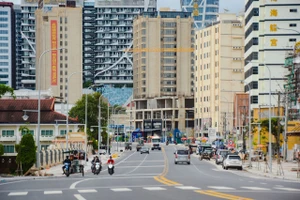
In Cambodia, a casino building boom in coastal Sihanoukville fed an offshore gaming frenzy overwhelmingly targeting mainland Chinese players. President Xi prevailed upon Cambodia to outlaw offshore gaming by the end of 2019 – the Philippines continues to respectfully decline China’s requests – amid an increasingly tightening noose on underground banking and illegal money transfers plus explicit efforts to curb Chinese travellers’ overseas gambling.
The November 2021 arrest of high profile Suncity chairman Alvin Chau sent a clear message. Even when Covid ceased restricting travel and crimping economic expansion, the VIP boom had gone bust.
Covid symptoms linger
Make no mistake, Covid hurt Naga too. At first, Naga seemed to weather that storm well, relying on Phnom Penh’s residents linked to massive mainland Chinese investment. But that population dissipated as China’s economy contracted and keeping money onshore became a higher priority.
The revival of Chinese overseas travel has been slow globally, with Cambodia being no exception. In 2019, 2.4 million Chinese travellers accounted for 36% of Cambodia’s arrivals, representing the largest national grouping. Last year, Chinese travellers numbered 547,789, off 73% from 2019, as overall arrivals recovered to 5.4 million, 82% of 2019’s record 6.6 million.
Prime Minister Hun Manet, who succeeded his long ruling father Hun Sen last August, is credited with courting renewed Chinese and other foreign investment. Chinese business activity in Cambodia is reportedly on the upswing but hasn’t recovered to even 2021 levels.
Naga top management, speaking to iGaming Business on condition of anonymity, says resident expatriates drive its results. Customers from mainland China, whether residents or visitors, account for 50% of VIP play. Last year Naga’s US$337m mass revenue was 29% below 2019. VIP revenue of US$178m was 86% below 2019. The latter segment appears unlikely to approach previous heights.
‘Missing the Former Glory’
Morgan Stanley downgraded Naga’s shares to equal weight from overweight following the company’s full-year earnings announcement in February. In their report titled Missing the Former Glory, analysts Gareth Leung and Praveen Choudhary write that “concrete plans from management on how to accelerate growth and/or signs of meaningful visitation improvement are needed to turn positive on the stock”.

“Other Asian operators have pivoted to become more mass market focused,” Steinberg, managing partner of AM Steinberg Advisors, says. “Naga should be able to make the same pivot.”
In July, Naga postponed the completion date for Naga3 by four years to 2029, considering project resizing and other measures to match “revenue generation with capex expenditure”.
“Likely Naga 3 will be a slow burn through to completion,” McCamley, whose resume includes heading The Grand Ho Tram in neighbouring Vietnam, says. “In my opinion, it will be a lengthy ROI and face many challenges to fulfil its potential, given how market conditions have evolved.”
“Delaying Naga3 was an appropriate tactic to ensure the company continues to operate in the black,” Gallaway says. “To be successful, Naga3 will need to focus on generating profit from revenue centres in addition to the casino. It’s the natural evolution of successful IRs around the world.”
Naga’s non-gaming revenue – 4% last year – has languished in the low single digits since Naga2 opened.
“That’s what Naga3 is about,” management says, adding retail, F&B, entertainment and other non-gaming amenities on a scale beyond NagaWorld’s capacity. Despite the announced delay, work continues on Naga3. Management expects project substructure to be finished by the end of June.
Unspoken agenda
Management’s unspoken Naga3 view is that completion by September 2029 doesn’t preclude opening portions of the complex sooner. “We have some flexibility. Maybe complete the podium first, with its revenue generators,” including the casino, F&B and retail. With hotel occupancy below 50%, management sees no imminent need for more guest rooms.
The decision to delay Naga3 came while Naga’s founder was still senior CEO under the company’s 5 April 2022 reorganisation. That reshuffle made his sons Chen Yiy Fon, Chen Cherchi and Chen Yiy Hwuan CEOs of different functional areas of the company.
All three sons were already Naga executives with significant histories at the company. Former FBI agent Timothy McNally remained as Naga’s chairman. Nevertheless, the unusual CEO arrangement evoked skepticism in the gaming and investment communities.
Succession planning
While the word “succession” does not appear in the April 2022 filing, Naga executives call those changes preparations to ensure a smooth transition following Chen’s passing.
Chen Yiy Fon took the founder’s role as group CEO in December. He’s helmed three Malaysia-listed companies controlled by his father, including resort operator Karambunai, and has long been heir apparent.
“With a proven track record of successful management and a deep understanding of the industry, Yiy Fon is poised to contribute significantly to Naga’s upcoming endeavours’ strategic direction and development,” Steelman says.
Under the founder, Naga exhibited creativity and nimbleness and some adaptations to current realities are evident around the resort.
Squeeze baccarat minimums have fallen from US$100 to US$50 on mass casino floors. The sportsbook, once shoehorned into a corner between two themed casino areas, has taken over one of those casino areas, enhanced with a sports bar. Tables for popular Southeast Asian card games nui nui, ngau ham and bai buu have proliferated throughout the resort, with minimum bets for those games $25 or less, blackjack and sic bo minimums as low as $10.
“Naga, like all gaming companies in Asia, needs to adjust their business strategy given the political dynamics of the PRC and casino gaming,” Gallaway says. “The future lies in continuing to adjust its strategy to remain profitable.”

